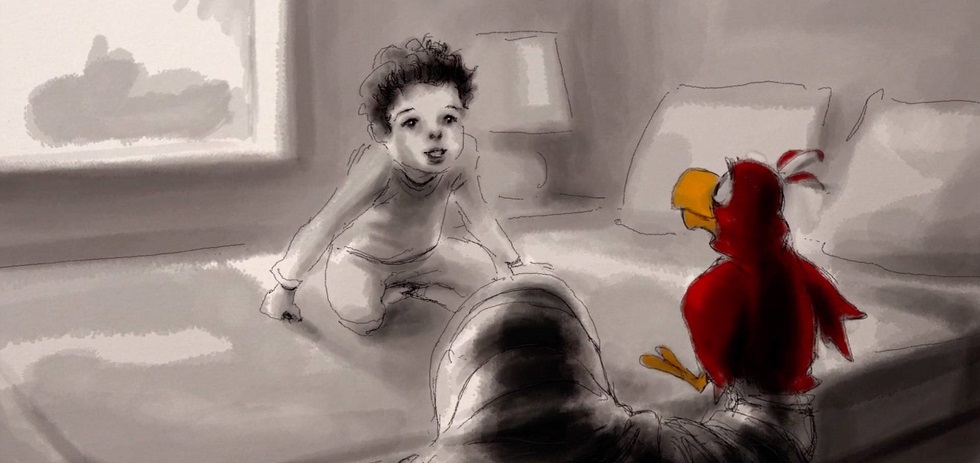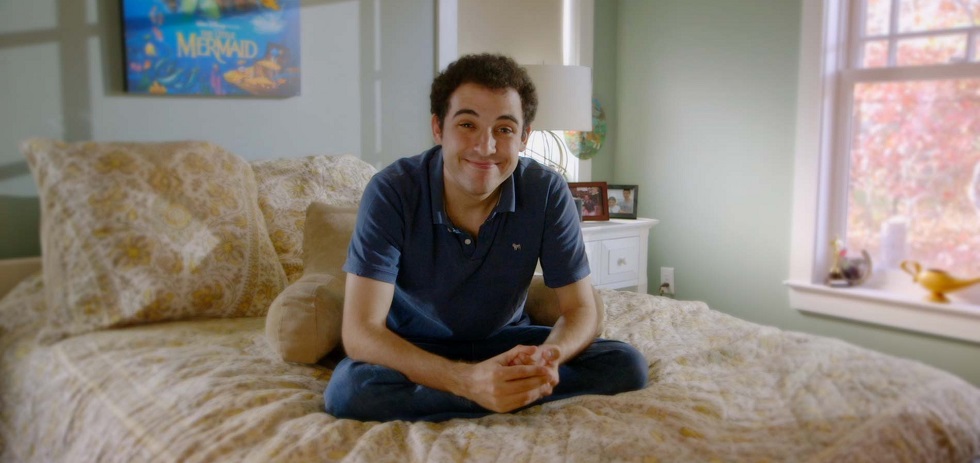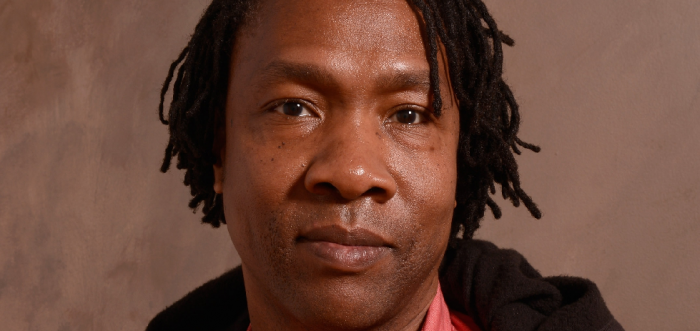Roger Ross Williams won the 2010 Oscar for Short Documentary with Music Plays Prudence, about a Zimbabwean singer mistreated for her physical disability. Significant as this achievement was, it represented the peak of an already impressive career in various media, including journalism and TV production, and the start of its exciting new phase. Williams was tapped by former colleague Ron Suskind to direct a feature based on the book he had written about his son Owen, who learned to express himself and deal with his regressive autism through the characters and stories of animated Disney films. He, along with his father and Williams, are now taking the film to festivals around the world, and earning rave responses from audiences and critics alike. We sat down with Williams during his attendance at the Melbourne International Film Festival and spoke about the film, as well as his overall ambitions for documentary features.
In the past you’ve shot films in places like Zimbabwe and Uganda, but Life, Animated is set in suburban America. Did it feel like a homecoming, or was it just as much of an endeavour this time around?
Um, no, it wasn’t a homecoming. For me, I always focus on films about outsiders, about people who have been looked past in society, whether that’s Prudence, who’s physically disabled… and that was really about her culture that saw her as cursed and part of the witchcraft and her rising above that. The same thing with Life, Animated… [Owen] went to Ron and Cornelia and said “People don’t see me for who I am, people look past me on the street”, and he said, “I’m a diamond in the rough, an unpolished gem”. That’s what this film is about: really getting into Owen’s head and seeing the world from his point of view; from the inside looking out as opposed to… you know, a lot of films about people with disabilities are from the outside looking in, and this is really about experiencing the world through Owen’s beautiful, rich, amazing mind.
Ron wrote the book on which this is based. Did it feel like you were inheriting any responsibility from him, as far as authoring the story?
Yeah, but for me, it was really important not to just re-tell the story in the book, because the book all happens in the past. I chose to follow Owen in the present, and follow him in this really transformative year in his life when he’s about to graduate from school. He’s fallen in love, he is about to become independent, and that was really exciting so for me it was always a coming-of-age story, about a young man. It’s not a film about autism, it’s a coming-of-age story about a young man, and the themes are family, love, and the power of story. It’s really about the power of story to transform this young man’s life.
Owen obviously has such an impact on the way you tell the story, at least with the events of his life and the stories on which the animated segments are based. Did he have any explicit say on how you constructed the documentary, or did he just leave it in your hands?
Owen? Oh, no. Owen saw the film when it was done with his father. None of the subjects had any editorial say. The sidekicks story is Owen’s story that he created, so we just brought it to life but with my amazing animators in Paris called Mac Guff, so that was his story as far as Ron or anyone… they saw it when it was finished.
You mention Mac Guff—I imagine going to any animation studio that isn’t Disney and saying that you have the Disney IP to work with, that must be a big ask…
Yeah…
…or an exciting task…
Well, when I first went to Mac Guff, we didn’t have that…
Oh, ok!
…that was a process with Disney, but yes, they were excited. Mac Guff, they’re a 3D animation house. They did Despicable Me, Minions, The Lorax, big Hollywood films. And they have a major studio, they have hundreds and hundreds of people. But Philippe [Sonrier], the founder and creator of Mac Guff, is this very eccentric character who lived for 15 years on a boat on the Senne. When I pitched this to him, he really loved the story and he’s like, “we’re not gonna make money off this”, because we’re a documentary; we don’t have those kinds of budgets. He did it as a passion project, and what he did was he assembled a group of really brilliant young French animators right out of French animation school. And I really wanted French, because the French were doing really interesting work in hand-drawn 2D animation, and I wanted it to have a completely different feel from Disney because it’s Owen’s creation, which looks very different than Disney films.

The film hinges on this moment where Ron put on the Iago puppet and reaches him in a way he didn’t before—it really feels like a key-in-the-lock sort of moment. Was there anything like that moment between you and Owen, when you realised you were reaching him on a deeper level as a documentary subject, or was it just smooth sailing from the start?
It wasn’t necessarily Owen—it was me who needed to be sort of unlocked. I didn’t understand autism, I didn’t know anyone with autism, so I needed to be enlightened, so to speak. I think as I became enlightened, I realised the audience needs to take that journey too. The greatest compliment I get is from people who are like, “I know nothing about [autism], now I totally get it, I totally understand”. It was about taking the audience into Owen’s reality. Owen is wise about life because he’s grown up on this diet of story and myth and fable and these are classic morality tales; classic fables that have been told for thousands of years that Disney has taken and updated. Those stories are what we need to connect as people. It makes us human. It’s sort of a roadmap, and Owen becomes an expert on that. I realised that Owen has so much to offer the world, and so much definitely to offer me. Everyone with autism probably—if you can find that key like Ron did—has something to offer, and that we’re sort of losing out as a society if we ignore this huge and growing population in the world.
Do you feel like your past experience in, say, reality television has led you to be able to adapt to those events better?
Oh, a long time ago, I did one reality show… it’s more my training as a journalist. I spent 15 years as a working journalist and made a lot of hour-long documentaries for television, working for The New York Times. They used to have their own cable channel, New York Times Television, where we would turn articles in the New York Times into hours. It was like training. It was like my film school. I always say I’m a recovering journalist, because I threw out the bad stuff and kept the good stuff that I need for my filmmaking. It’s a different mindset. I hated reality television, I still do. I did one episode of Undercover Boss, and they put that on IMDB. While I was shooting that episode, I got a call that my first film had been nominated for an Academy Award, and I was like “I’m outta here”. It was so great. (laughs)
(laughs) That is amazing.
It was the most miserable experience. It was a 7-Eleven episode, and I was shooting this shot where it’s totally fake, where the CEO’s cleaning the parking lot in the middle of the night. There’s nothing real about reality television—there’s ten million camera and crews and all this stuff, and he’s supposed to be lonely out there. They said they wanted a documentary-style filmmaker. I was like “This is so not documentary!” The 150 crew members, set up in a van full of television executives and executive producers…. it was crazy! That was sweet, it was a sweet moment.
Oh, I can imagine. Far out. And so, you’re answering to producers on that kind of show. Meanwhile, Ron Suskind is the executive producer on this show…
That’s just because we had to option his book. He didn’t have anything to do with the editorial content. He saw the film when it was done. Because he’s a subject, he understands that he’s the subject and as a journalist, he understands that he needed to not be involved and just be treated as a subject… which is hard for him!
Certainly a more creatively free experience, I would imagine.
Yeah, totally. Totally creatively free, I don’t answer to anyone except myself now.

Taking this film around the world, from what I’ve read it’s been received incredibly well; people have responded really well. I wonder, is there a unique intensity by virtue of it being attached to these Disney characters, which people have been attached to all their lives like Owen has? Is there a unique energy?
Yeah, I never experienced anything like what I’m experiencing with this film. We’ve won six audience awards at festivals, and it’s because audiences can so connect to the story, to the universal themes in the story, to Disney. There’s so much red meat for people to go after, and it’s extraordinary. The Suskinds have been with me a lot of these festivals across the country. When Owen is on-stage, it’s unbelievable. People are on their feet cheering. He’s high-fiving people going down the aisle. He knows how to work the crowd. He’s thriving, he’s like on fire. It’s amazing to watch, and even Ron and Cornelia are amazed. He announces to everyone that he’s looking for a girlfriend. (laughs) Because he has no filter, that’s just who he is. He’s like, “I don’t want to be single forever, everyone. If anyone knows of a girl in the Boston area…” (laughs) Imagine if we all did that.
I know, but after having seen the film it’s just like “well, you know…”. He means perfectly well.
Yeah, it’s so great.
It’s so cool that he’s embracing that festival circuit as well…
Oh, and the theatrical, he’s doing Q&As in theatres, all over the country. He loves doing Q&As. He loves calling on people and controlling the Q&A. It’s amazing to see. Someone said, “Owen, you’re a celebrity”, and he said, “no, I’m not a celebrity, celebrities are out for themselves, I’m just someone who’s being celebrated this year”. (laughs)
I thought I admired him already, but…
I know. It’s like, how does he… he’s so wise. It’s just amazing.
We talked about your experience in documentary forms in TV, and from what I understand, you’re planning like film and a transmedia project, and you look like you’re working across many different forms. What does cinema give you that other creative forms don’t?
It allows me to work in a way where the audience can collectively experience something. When it’s a shared experience between a group of people, and the group of people take this journey together, there’s magic. There’s something incredible about that, which obviously doesn’t happen in VR, where you’re very isolated, or television or any of the other things. There is nothing like the shared experience of going to the movies. It’s tough for documentaries, because people don’t go to the cinema to see documentaries, but I hope to make the kind of documentaries that bring people to the cinema, so they can have that shared experience, and all types of people from all different types of communities. I’ve just become Governor of the Academy of Motion Pictures Arts and Sciences, the Documentary branch, and as Governor and the spokesperson and ambassador for the documentary community, I really want to keep… you know, it’s the goal of the Academy and it’s my goal to really push theatrical documentaries, and draw people into the theatre to have that amazing shared experience.
Life, Animated screens at the Melbourne International Film Festival on August 12, and receives an Australian theatrical release on September 29, courtesy of Madman. You can read our review of the film here.
